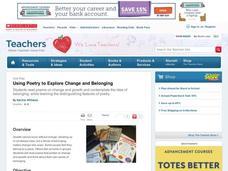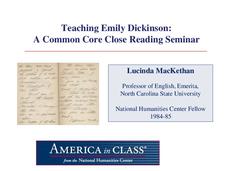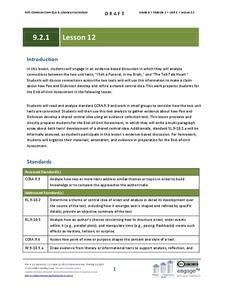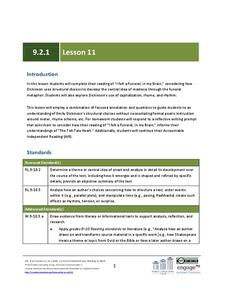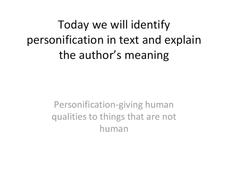Core Knowledge Foundation
Unit 7: Poetry
Over the course of a 12-lesson language arts unit, young scholars analyze a variety of poems taking a close look at figurative language and tone. They learn to compare and contrast, improve comprehension, and identify settings. To...
Academy of American Poets
Women in Poetry
Imagine linking poetry to technology! Thirty-three lessons comprise a 6-week "Women in Poetry" unit for high schoolers. Class members research women poets, learn how to respond electronically to discussions, write their poems, create web...
Scholastic
Using Poetry to Explore Change and Belonging
Change, growth, and a sense of belonging are the focus of a unit that uses poetry to explore these themes and the distinguishing features of poetry as well.
Curated OER
Poetry Assignment
As the culminating activity in a unit study of poetry, class members demonstrate what they have learned about poetry by creating a notebook containing original poems they have written, published poems they enjoy, and analyses of these...
Academy of American Poets
Teach This Poem: “One day is there of the series” by Emily Dickinson
A lesson plan begins with learners saying three words they associate with Thanksgiving dinner. They examine a picture of a menu from a Thanksgiving meal and discuss what they believe the artist wants them to feel, pointing out details....
Digital Public Library of America
The Poetry of Emily Dickinson
Are you contemplating a poetry study featuring Emily Dickinson? Finding good primary sources to accompany the study can be a challenge—never fear, help is here! Check out this primary source set that includes manuscripts of several of...
Weber County Library
Abstract Ideas Explored: Writing with Extended Metaphor
A 25-page packet includes eight detailed lesson plans centered around poems by Emily Dickinson. Each lesson plan begins with a burning question that students attempt to answer by using evidence from Dickinson's poems.
Annenberg Foundation
Gothic Undercurrents
Terror, mystery, excitement. American writers of the 19th century, including Nathaniel Hawthorne, Herman Melville, and Emily Dickinson, used these elements to create morally ambiguous tales that challenged the prevailing belief in...
Santa Ana Unified School District
Early American Poets
The poems of Walt Whitman and Emily Dickinson are the focus of a unit that asks readers to consider how an artist's life and changes in society influences his or her work. After careful study of Whitman's and Dickinson's perspectives on...
National Humanities Center
Teaching Emily Dickinson: A Common Core Close Reading Seminar
Three of Emily Dickinson's poems, "I like to see it," "Because I could not stop for Death," and "We grow accustomed to the Dark," provide instructors with an opportunity to model for class members how to use close reading strategies to...
Fluence Learning
Writing About Literature: Nature in the Writings of John Muir and Emily Dickinson
As an assessment of their skill in crafting a compare and contrast essay, class members read and compare the portrayals of nature in excerpts from naturalist John Muir's My First Summer in the Sierra and from poet Emily Dickinson's "The...
Prestwick House
"Because I could not stop for Death" -- Visualizing Meaning and Tone
Emily Dickinson's "Because I could not stop for Death" provides high schoolers with an opportunity to practice their critical thinking skills. They examine the images, diction, rhythm, and rhyme scheme the poet uses and consider how...
Read Works
Hope Is the Thing with Feathers
One of Emily Dickinson's most poignant works is the focus of a poetry analysis activity. After reading "Hope Is the Thing with Feathers," individuals answer ten multiple-choice and short-answer questions about the elements found...
EngageNY
Grade 9 ELA Module 2: Unit 1, Lesson 13
Whether the planks hide the beating of a hideous heart or they break away to the madness beneath, their presence makes itself known in the final instructional activity of a literary analysis unit. Having gathered textual evidence from...
EngageNY
Grade 9 ELA Module 2: Unit 1, Lesson 12
What happens when a tenuous grasp on sanity begins to slip? Compare Edgar Allan Poe's "The Tell-Tale Heart" and Emily Dickinson's "I Felt a Funeral, in my Brain" with a lesson plan focused on developing a common central idea. High...
EngageNY
Grade 9 ELA Module 2: Unit 1, Lesson 11
The capitalization rules are strict and inflexible—until you experience the fluid beauty of an Emily Dickinson poem. Ninth graders test their existing knowledge of language arts conventions with the many bent grammar rules in "I Felt a...
EngageNY
Grade 9 ELA Module 2: Unit 1, Lesson 10
An engaging unit connects Edgar Allan Poe and Emily Dickinson's shared themes of madness and departure from reality. The 10th lesson in the unit explores Dickinson's figurative language and structure choices in "I Felt a Funeral, in my...
EngageNY
Grade 9 ELA Module 2: Unit 1, Lesson 9
Continue analyzing literature using textual evidence with a lesson on "I Felt A Funeral, in my Brain" by Emily Dickinson. Ninth graders bring their annotation skills and knowledge of figurative language from the previous eight sessions...
Core Knowledge Foundation
Sixth Grade Poetry
Study some of the most prominent poets and works of poetry in history with a language arts poetry unit. From Virgil to Shakespeare to Dickinson to Angelou, the resources present biographies and examples of poetic elements to the sixth...
Curated OER
Landscapes of the Mind
High schoolers review Emily Dickinson's biography and examine themes and forms of some of her poems. They measure ways Graham integrates aspects of Dickinson's life and the themes and forms of her poetry into Letters to the World.
Curated OER
Personification
Introduce your young scholars to personification. The literary device is clearly defined and illustrated with clever examples. Opportunities for guided and independent practice using poems by Emily Dickinson and Langston Hughes are also...
Curated OER
Letters from Emily Dickinson: Letters and Poems
Students analyze how Emily Dickinson perceived herself as a poet. Students read correspondence between Dickinson and her preceptor, Mr. Higginson to determine the depths of their relationship. Students interpret several of her poems.
National Endowment for the Humanities
Emulating Emily Dickinson: Poetry Writing
High schoolers analyze mood and voice in Emily Dickinson's poem, "There's a Certain Slant of Light." After the analysis, students write a poem of their own emulating the Dickinson poem, and then write a one-page essay describing what...
National Endowment for the Humanities
In Emily Dickinson's Own Words: Letters and Poems
Analyze the depth and beauty of American Literature by reading Emily Dickinson's letters and poems. The class analyzes Dickinson's poetic style and discusses Thomas Wentworth Higginson's editorial relationship with Dickinson. They pay...




